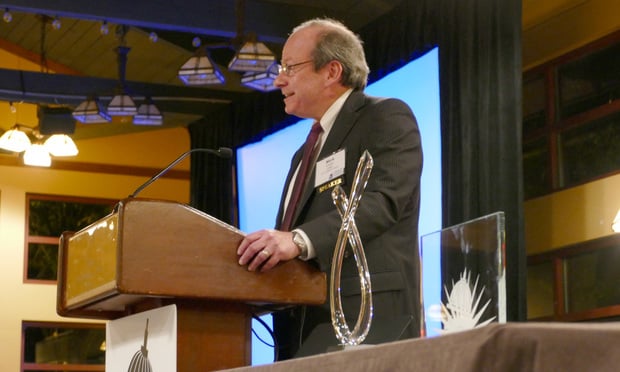First Amendment Foundation Honors Manis, Carter Center
The Georgia First Amendment Foundation honored a judge with a passion for open government and the Carter Center's global access to information program.
October 24, 2017 at 12:05 PM
4 minute read
 Judge Mark Cohen
Judge Mark Cohen(Photo by John McCosh)
A late Fulton County judge and the Carter Center's international effort to increase access to information were honored Oct. 19 at the Georgia First Amendment Foundation's annual dinner.
The group gave its “Open Government Hero” award posthumously to Fulton County Superior Court Judge Stephanie Manis, who died in December at age 76.
U.S. District Court Judge Mark Cohen spoke about Manis, who was his mentor when they both worked in the Georgia Department of Law.
He recalled Manis fielding calls for hours from citizens who were getting nowhere in their efforts to see public information from cities. “She couldn't file suit, but she helped” people so they understood their rights, he said.
Manis' view, Cohen said, was that, if government officials weren't giving citizens access to something they were entitled to see, “It usually means something illegal or improper is going on.”
Cohen said that, on the Fulton County bench, where she presided over cases from 1995 until shortly before her death last year, Manis approached motions to seal documents or close courtrooms like this: Show me where law allows the judge to do that and tell me why I should.
On the federal bench since 2014, Cohen said that, when parties bring similar requests his way, he asks himself, “What would Stephanie Manis do? And the answer is usually obvious.”
The foundation's annual dinner is named for the late Justice Charles Weltner of the Supreme Court of Georgia.
The recipient of the Weltner Freedom of Information Award was the Carter Center's Global Access to Information Program, which assists governments in becoming more transparent and helps citizens learn how to access information that affects public affairs.
The right to information is “a linking right,” said the group's director, Laura Neuman. She told stories about how people in developing countries—once they knew they had a right to information—were able to exercise their rights to proper schooling, government subsidies and working infrastructure.
 Judge Mark Cohen
Judge Mark Cohen(Photo by John McCosh)
A late Fulton County judge and the Carter Center's international effort to increase access to information were honored Oct. 19 at the Georgia First Amendment Foundation's annual dinner.
The group gave its “Open Government Hero” award posthumously to Fulton County Superior Court Judge Stephanie Manis, who died in December at age 76.
U.S. District Court Judge Mark Cohen spoke about Manis, who was his mentor when they both worked in the Georgia Department of Law.
He recalled Manis fielding calls for hours from citizens who were getting nowhere in their efforts to see public information from cities. “She couldn't file suit, but she helped” people so they understood their rights, he said.
Manis' view, Cohen said, was that, if government officials weren't giving citizens access to something they were entitled to see, “It usually means something illegal or improper is going on.”
Cohen said that, on the Fulton County bench, where she presided over cases from 1995 until shortly before her death last year, Manis approached motions to seal documents or close courtrooms like this: Show me where law allows the judge to do that and tell me why I should.
On the federal bench since 2014, Cohen said that, when parties bring similar requests his way, he asks himself, “What would Stephanie Manis do? And the answer is usually obvious.”
The foundation's annual dinner is named for the late Justice Charles Weltner of the Supreme Court of Georgia.
The recipient of the Weltner Freedom of Information Award was the Carter Center's Global Access to Information Program, which assists governments in becoming more transparent and helps citizens learn how to access information that affects public affairs.
The right to information is “a linking right,” said the group's director, Laura Neuman. She told stories about how people in developing countries—once they knew they had a right to information—were able to exercise their rights to proper schooling, government subsidies and working infrastructure.
This content has been archived. It is available through our partners, LexisNexis® and Bloomberg Law.
To view this content, please continue to their sites.
Not a Lexis Subscriber?
Subscribe Now
Not a Bloomberg Law Subscriber?
Subscribe Now
NOT FOR REPRINT
© 2025 ALM Global, LLC, All Rights Reserved. Request academic re-use from www.copyright.com. All other uses, submit a request to [email protected]. For more information visit Asset & Logo Licensing.
You Might Like
View All
12-Partner Team 'Surprises' Atlanta Firm’s Leaders With Exit to Launch New Reed Smith Office
4 minute read
After Breakaway From FisherBroyles, Pierson Ferdinand Bills $75M in First Year
5 minute read
On the Move: Freeman Mathis & Gary Adds Florida Partners, Employment Pro Joins Jackson Lewis
6 minute readTrending Stories
- 1Perkins Coie Lures Former Longtime Wilson Sonsini Tech Transactions Partner
- 2‘The Decision Will Help Others’: NJ Supreme Court Reverses Appellate Div. in OPRA Claim Over Body-Worn Camera Footage
- 3MoFo Associate Sees a Familiar Face During Her First Appellate Argument: Justice Breyer
- 4Antitrust in Trump 2.0: Expect Gap Filling from State Attorneys General
- 5People in the News—Jan. 22, 2025—Knox McLaughlin, Saxton & Stump
Who Got The Work
J. Brugh Lower of Gibbons has entered an appearance for industrial equipment supplier Devco Corporation in a pending trademark infringement lawsuit. The suit, accusing the defendant of selling knock-off Graco products, was filed Dec. 18 in New Jersey District Court by Rivkin Radler on behalf of Graco Inc. and Graco Minnesota. The case, assigned to U.S. District Judge Zahid N. Quraishi, is 3:24-cv-11294, Graco Inc. et al v. Devco Corporation.
Who Got The Work
Rebecca Maller-Stein and Kent A. Yalowitz of Arnold & Porter Kaye Scholer have entered their appearances for Hanaco Venture Capital and its executives, Lior Prosor and David Frankel, in a pending securities lawsuit. The action, filed on Dec. 24 in New York Southern District Court by Zell, Aron & Co. on behalf of Goldeneye Advisors, accuses the defendants of negligently and fraudulently managing the plaintiff's $1 million investment. The case, assigned to U.S. District Judge Vernon S. Broderick, is 1:24-cv-09918, Goldeneye Advisors, LLC v. Hanaco Venture Capital, Ltd. et al.
Who Got The Work
Attorneys from A&O Shearman has stepped in as defense counsel for Toronto-Dominion Bank and other defendants in a pending securities class action. The suit, filed Dec. 11 in New York Southern District Court by Bleichmar Fonti & Auld, accuses the defendants of concealing the bank's 'pervasive' deficiencies in regards to its compliance with the Bank Secrecy Act and the quality of its anti-money laundering controls. The case, assigned to U.S. District Judge Arun Subramanian, is 1:24-cv-09445, Gonzalez v. The Toronto-Dominion Bank et al.
Who Got The Work
Crown Castle International, a Pennsylvania company providing shared communications infrastructure, has turned to Luke D. Wolf of Gordon Rees Scully Mansukhani to fend off a pending breach-of-contract lawsuit. The court action, filed Nov. 25 in Michigan Eastern District Court by Hooper Hathaway PC on behalf of The Town Residences LLC, accuses Crown Castle of failing to transfer approximately $30,000 in utility payments from T-Mobile in breach of a roof-top lease and assignment agreement. The case, assigned to U.S. District Judge Susan K. Declercq, is 2:24-cv-13131, The Town Residences LLC v. T-Mobile US, Inc. et al.
Who Got The Work
Wilfred P. Coronato and Daniel M. Schwartz of McCarter & English have stepped in as defense counsel to Electrolux Home Products Inc. in a pending product liability lawsuit. The court action, filed Nov. 26 in New York Eastern District Court by Poulos Lopiccolo PC and Nagel Rice LLP on behalf of David Stern, alleges that the defendant's refrigerators’ drawers and shelving repeatedly break and fall apart within months after purchase. The case, assigned to U.S. District Judge Joan M. Azrack, is 2:24-cv-08204, Stern v. Electrolux Home Products, Inc.
Featured Firms
Law Offices of Gary Martin Hays & Associates, P.C.
(470) 294-1674
Law Offices of Mark E. Salomone
(857) 444-6468
Smith & Hassler
(713) 739-1250







